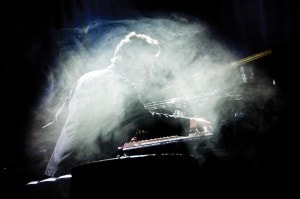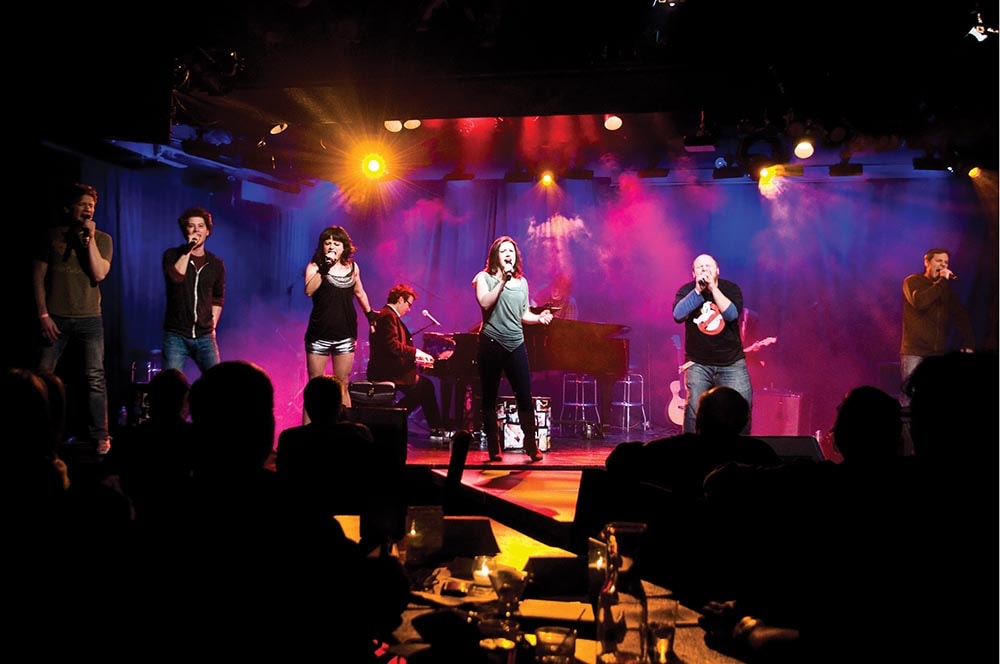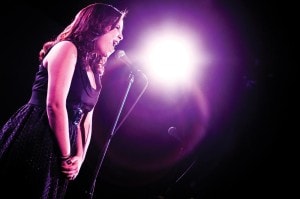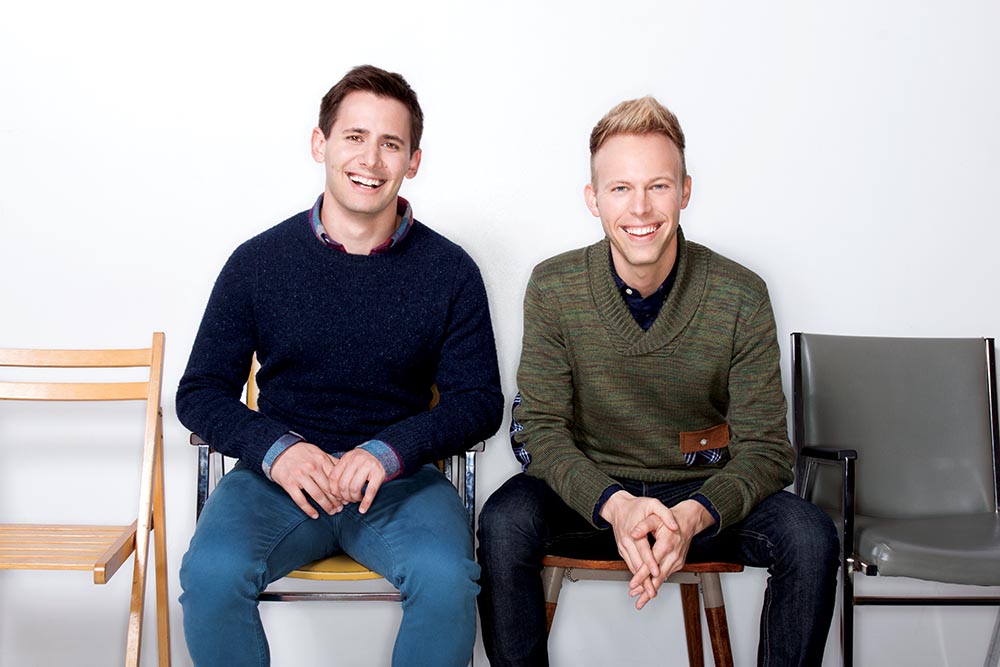Benj Pasek and Justin Paul are trying to remember when they first filmed their musical Edges. On a sunny morning, the composer/lyricists are lounging in Paul’s Harlem apartment and carefully recounting their first, almost accidental endeavor.
It happened while they were studying acting at the University of Michigan, and the pair got cast as “man with camera” and “Japanese backup dancer” in their sophomore-year musical City of Angels. But rather than have their moms come to Ann Arbor to watch them stand in the background, they decided to use their free time to write some music of their own. They booked the local 110-seat Kerrytown Concert House before completing 13 original songs, and (though they considered canceling) the performance of Edges went on as planned on April 3, 2005.
Just two months earlier, a video-sharing website named YouTube had made its debut on the World Wide Web.
“We didn’t film it first,” Paul affirms, though some donors to Michigan’s musical-theatre program did contribute a sum of around $1,000 after the first showing of Edges so the pair could make a recording. “Other people started putting stuff online before we did.”
“What was so revolutionary about Facebook and YouTube was this democratization of who could have access to putting stuff online.”
Those other people no doubt witnessed the show’s evolution through what became the Edges “national tour”—essentially a glorified road trip to play the hometown venues of some of the show’s four performers as well as those of both composers, culminating in a one-night showing at the Abingdon Theatre Complex in New York City. “[Audiences] didn’t hear about it because there was an Off-Broadway cast album—they heard about it organically through Facebook,” Paul clarifies. “Even before we did, other people started posting videos of their own school productions, or of them singing the show’s songs.”
Pasek had reached out to several schools via Facebook, also new at the time, to see if they were interested in doing the show. If you recall, in its early days, Facebook only existed at a series of universities and required a “.edu” e-mail address for access, so discovering musical-theatre programs and performers within that network was easier than it is today. (There was also a song in Edges known as “The Facebook Song,” and students would contact Facebook about performing it; Facebook redirected the requests to the duo, and those requests could lead to productions.) “It was primitive licensing,” Paul explains.
It wasn’t primitive for long. The song cycle, loosely centered on the intense life decisions that young people have to make, caught the attention of Music Theatre International. “What really appealed to us about Edges was the fact that there was already interest from groups that wanted to license the show,” explains Drew Cohen, president of MTI. “Much the way a record company might be interested in a band that is already performing in local venues and developing a fan base, to us it’s interesting when a work is already being licensed by the authors or being performed by other universities.”
The musical, now with an expanded list of 16 songs, went on to have its first professional production at Capital Repertory Theatre in Albany, N.Y., in 2007, and that same year, Pasek and Paul won the prestigious Jonathan Larson Award for the show. (Pasek illegally filmed the Albany production of the show from the back row; those are the videos that most people still watch today on YouTube.) Now that Pasek and Paul are Tony-nominated songwriters for A Christmas Story: The Musical and Lucille Lortel Award winners for Dogfight, the pair hasn’t forgotten the debt they owe to YouTube.
“To this day, Edges has never had a New York City professional production,” says Pasek, though it has had countless stagings and has even been translated into other languages, including Cantonese.
Pasek elaborates on how the Internet changed the distribution model: “Shows needed to exist in New York—you needed at least an Off-Off-Broadway production to spread the word. What was so revolutionary about Facebook and YouTube was this democratization of who could have access to putting stuff online, and being able to see it right away. So you could be in Iowa or Singapore, and you could see your content immediately without having to go to New York. And as writers, we didn’t have to go through any traditional means of getting it out there—we just put it online.”

Around the same time Pasek and Paul were joining forces, another rising composer/lyricist was using a similar model. Joe Iconis had just graduated from New York University’s musical-theatre writing program. Finding himself frustrated with the development process of his musical The Black Suits, he turned to writing songs for a concert to get his music out more quickly. Rather than put together a collection of “greatest hits”—as a young writer, he could hardly claim any hits yet—he gave the show a title: Things to Ruin.
The concert premiered at Ars Nova in 2006, marking the first time Iconis’s work was professionally performed (and filmed). Initially, Iconis admits he saw the videos as nothing more than a commercial for the show, which would go on to be performed around the city, still in concert form, at the Zipper Factory, Second Stage Theatre and Le Poisson Rouge. However, the nature of Things to Ruin—Iconis calls it a “short-story collection”—means that its songs can stand alone as “five-minute experiences,” more than songs from a book musical might.
“I wouldn’t necessarily put a song from a book musical on YouTube—an honest-to-goodness book musical should be experienced from start to finish,” Iconis contends. Iconis estimates that roughly 80 percent of Things to Ruin is online, but Things to Ruin is “more of a rock concert. If there’s a band like the Rolling Stones or Arcade Fire, I can watch 10 million of their YouTube videos, but it doesn’t make me not want to see them live. There’s a difference.”
Still, though Iconis says the connections between the show’s songs are purposefully vague, they do fit together as a cohesive unit, which is why Kurt Deutsch, president and co-founder of Sh-K-Boom and Ghostlight Records, decided to make the show’s album and advocate for licensing. Like Edges, Things to Ruin has never had an official New York production, but the presence of an album helps the show live on, and the YouTube videos can generate excitement and awareness of the piece. The show is now licensed through Rodgers & Hammerstein.
“Young composers have a hard time being hired by producers to write original musical scores, especially right out of college, but they come out with tons of amazing songs,” says Deutsch. “You can write a song and it can live on its own, and people can sing it for auditions, or you can put it up on YouTube and you can get a following. But what is even more appealing is the idea of taking your work and finding some sort of through-line or thematic structure so that it is complete—where you’re creating almost a concept album, or a revue, or a concert that just ties together. It gives artists more opportunities for financial success as a musical-theatre writer if they have something that can be performed and licensed. There’s much more opportunity for them to get their work out there.”
Deutsch cites Adam Guettel’s Myths and Hymns, Jason Robert Brown’s Songs for a New World and Richard Maltby Jr. and David Shire’s Closer than Ever as precursors to the form. Post–Things to Ruin, Iconis saw The Black Suits premiere last fall at Center Theatre Group in Los Angeles, and he has written for the short-lived television musical drama “Smash.” His show Be More Chill will premiere at New Jersey’s Two River Theater in 2015.

Now virtually every emerging musical-theatre composer produces his or her own concerts and puts the footage up on YouTube, thanks to Shoshana Feinstein. Feinstein’s company Famous in NY has structured her company around young composers’ impulse to publicize and distribute their work via social media; she films an average of five concerts per week for a flat fee. “The reason to do a concert is for the YouTube videos,” asserts Feinstein.
Still, social media is more of a means than an end for theatrical songwriters. It’s easy to get trapped in the concert cycle, with its immediate response, instead of turning the focus to writing full-length musicals. While shows like Edges and Things to Ruin both gained momentum via social media, MTI’s Cohen says he doesn’t view YouTube as his main way to discover shows, though there are exceptions. “We don’t scour the web looking for new shows. Shows are generally presented to us by a lawyer, an agent, some kind of representative,” Cohen explains. “What YouTube does, though, from the authors’ point of view, is provide an affordable way of presenting their works.”
Indeed, there’s no question that the Internet has given songwriters the tools to generate excitement and license their own shows, even if a major agency doesn’t take notice. That’s been the experience of Kait Kerrigan and Brian Lowdermilk—the lyricist and composer have more than 3.5-million total views on their YouTube channel, and receive regular requests to license their shows, many of which have never been seen onstage except in a concert hall or cabaret club. “We get requests all the time from smaller theatre companies who are looking on the Internet to find new shows, things that haven’t been produced yet,” Kerrigan reports. “We created a concert called Party Worth Crashing that you could license—the idea of it is: Here’s all the material you would need to do a big concert, and here is our whole catalogue—you make your set list and we approve it, and you make your evening of theatre. We receive a few requests a month for that, and we don’t push it that hard. It’s just something that exists.”

Kerrigan and Lowdermilk were also licensing their show Tales from the Bad Years, but now the show is in talks with producers, which means they can no longer make it available. Kerrigan admits she is hesitant to license a show that has never gone through a development process with a theatre. “It’s a double-edged sword, because I want to have that professional development of a piece before it actually goes out into the world,” she says. “We’ve gone back and forth on whether or not that’s necessary, but having that institutional support changes the piece and makes it more solid.”
Another concern songwriters face by putting their entire catalogue up on YouTube is the potential threat that people will copy the material and produce the show without permission. While licensing companies like MTI and R&H have “licensing police,” when an artist like Kerrigan licenses a show herself, there’s no one to catch the piracy.
“We haven’t had many experiences of people trying to do a whole production without our permission—most people want to have goodwill and want to have a good reputation in this community,” notes Kerrigan—though there’s also the related concern that producers may not be interested in backing a show if most (or all) of it can be viewed online. That’s partly why Iconis believes that song cycles function better in the YouTube environment.
“I don’t think it hurts to have the songs up there,” Iconis shrugs. “I think you can know every single song backwards and forwards, and still have a perfectly satisfying experience when you see the show.”
That’s not the approach taken by another group of University of Michigan students, who took a cue from their predecessors Pasek and Paul and posted videos of a musical they wrote on YouTube. In their case, it was a full-fledged book show, and they put the entirety of it online. A Very Potter Musical, a loving Harry Potter parody, launched the Chicago-based theatre company StarKid Productions and one of its four owners, Darren Criss—who played the title role and co-wrote its score—to Internet and future “Glee” stardom.
The musical has more than a million views on YouTube, though the company can’t license the show or sell all of the songs due to copyright issues with the Harry Potter brand. In two Potter sequels, the writers specifically avoided this issue by writing songs that don’t reference the copyrighted material at all. And besides, their business model is thus far not based on song sales and licensing but on merchandise. Says Nick Lang, who owns the company along with his brother Matt, Brian Holden, and Criss: “The show itself wasn’t really a source of income, but the things around the show were. The shows are really big commercials for the T-shirts.”
StarKid has since written and produced six other full-length book musicals, including two more Potter parodies as well as Twisted, a Wicked-esque take on Aladdin told from Jafar’s perspective, and Starship, a futuristic show about a world populated by insects. All have led to licensing and production requests. But these aren’t the company’s goals.
“For us, once we do a show, we go, ‘Okay, that one is done. Let’s go do another one,’” says Lang. “If somebody sees it on YouTube, and says, ‘Hey, I would like to do a production of this,’ then we would be really open to that.” Lang confesses, though, that there is still concern that some shows aren’t ready for full productions. “We had some interest from producers after we did Starship and some offers to take it to New York, but we just thought the show wasn’t good enough to be out there and have our names attached to it. It’s out on the Internet, but we didn’t want to send it to New York and have producers look at it and go, ‘What is this? This is two hours too long and for little girls.’”
Lang says there’s a chance they’ll go back and revise Starship once Criss, who wrote the show’s music, has more time in his schedule after “Glee” concludes. Though most of their shows have only run for a weekend, last summer, StarKid did test out a model where they produced Twisted as a full-fledged musical and ran it for a month at the Greenhouse Theater Center in Chicago. They raised funds for the production on the online-fundraising platform Kickstarter and reached their goal four times over, thanks to their online following.
“There was a big discussion after we did Twisted about whether or not we were going to put it up on YouTube, because [composer] A.J. Holmes and [lyricist] Kaley McMahon were really interested in doing another production—they were very much questioning whether or not putting something up would kill its chances of being produced again,” explains Lang. On the other hand, he adds, the number of YouTube views and the promise of a rabid fan base is something that can attract producers’ support. “We eventually decided that if a producer wanted us to take it down, then they would take it down.”
For his part, Lang is more interested in churning out musicals in the YouTube cycle, and admits that he finds the long slog of musical development tedious. While Holmes and McMahon are pursuing producer interest for Twisted, Lang is more focused on the next musical.
This summer, the company will once again rent out a theatre, with two shows in rep for six weeks at Stage 773. First up is Ani, a parody of Star Wars from Darth Vader’s perspective, and The Trail to Oregon, which Lang describes as “a musicalized version of the video game.”
“It will be the first time that we try to budget so that the initial production can pay for itself and possibly turn a profit on the actual show, which I’m guessing is how theatre companies work,” says Lang, who has been relying on the YouTube awareness and merchandising model for the company’s entire existence and is trying to translate Internet fame into real-world productions. “It’s an inspiring thing to say, ‘Yes, the Internet makes things possible that were not possible before.’ We could not exist 20 years ago.”


